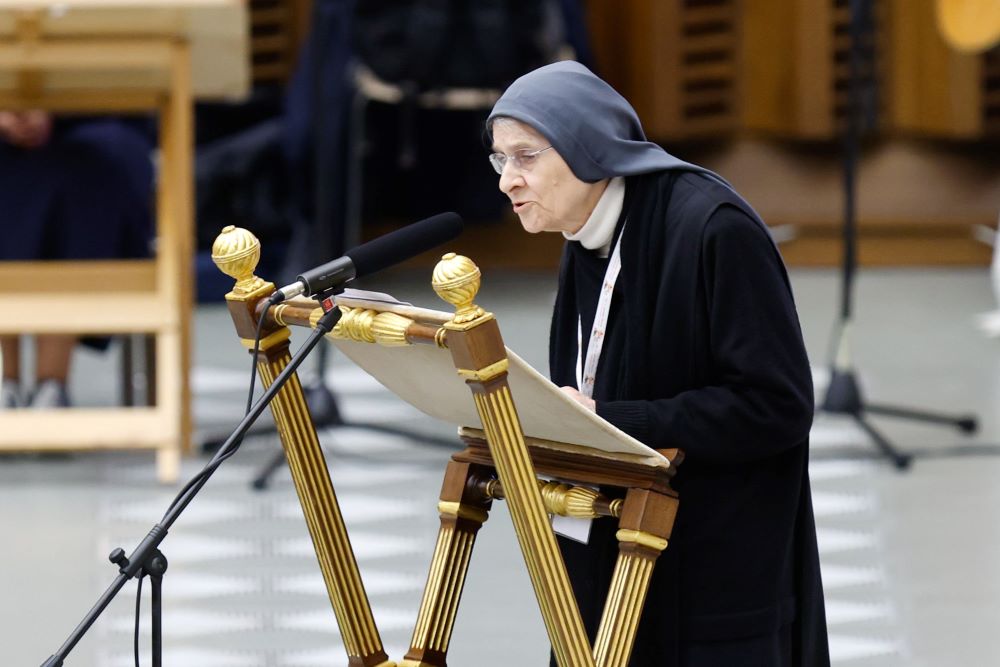
Benedictine Mother Maria Ignazia Angelini, a theologian, speaks during the morning session in the Paul VI Audience Hall at the Vatican Oct. 15. (CNS/Lola Gomez)
"Enough is enough!" say women from every part of the world at every step of the synod on synodality. We want to be treated as equals not only theoretically, in dignity, but also in church ministry. Unfortunately, the present understanding of holy orders, reserved for men, upholds hierarchical states of life and perpetuates patriarchy and discrimination.
To settle this issue of women's longing for equality in leadership, it is often proposed that women should also receive the sacrament of holy orders. However, I think most women are neither interested in becoming clerics nor mere administrators. Rather, they just want the church to declare that women are not excluded from ordained ministries because of their gender. Could we explore alternatives?
For example, if consecrated life were recognized as a sacrament, the issue would be largely resolved. It would be like hitting two birds with one stone, as vocations to consecrated life for women would likely increase, thereby helping reduce the shortage of priests in several parts of the world. How would this happen?
In an earlier column, which I see as foundational to my suggestions, I mentioned that Paul's words, "Christ is the head of every man, and a husband the head of his wife, and God the head of Christ" (1 Corinthians 11:3) could imply that Christ becomes the head of a woman united with him in consecrated life just as he is the head of every male priest. Both are answerable to him.
I don't think Paul intends to convey that men should dominate women. Instead, he is trying to find a workaround to patriarchal arguments (1 Corinthians 11:8-10) based on the Old Testament, which are becoming obstacles to women's ministry in the church. That's why he adds, "Woman is not independent of man, or man of woman 'n the Lord.' For just as woman came from man, so man is born of woman (1 Corinthians 11:11-12)." Accepting Jesus as the Lord demands a new way of life!
A consecrated woman can become "another Christ" through imitation of him and a life of holiness in union with him. It is unnecessary for any disciple to be male to represent them. Thus, her status as a minister becomes equivalent to that of a priest (1 Corinthians 11:11-12). Does this imply consecrated women can take up the same roles and ministries as those of priests? Maybe, or maybe not. This needs more reflection.
However, appointing women bishops from consecrated life could be the beginning of an alternative pathway to leadership and ministry in the church. Women have been apostles in the early church (Romans 16:7). Who but women are blessed with the natural gifts of birthing, feeding, nurturing and teaching? Isn't grace said to be built on nature? Moreover, servant leadership is natural to most women, although it could be said to be a positive side effect of patriarchy if it does not turn into servitude.
Advertisement
To facilitate this, the ancient understanding of "ordo" (or orders) could be revived. This would broaden the meaning of ordination to include consecrated women, thereby suggesting their setting apart and insertion [insertion/inscription in an ordo as a formal category] in a governing body with a specified role in the church. It is easy to imagine women in consecrated life taking up roles ordinarily assumed only by the clergy, such as baptizing, hearing confessions, witnessing marriages, anointing the sick and more.
I think many consecrated women have experienced laity wanting to confess their sins to us. Not only women and children, but also sisters would feel safe and comfortable confessing to a woman. Of course, consecrated women would require adequate training in theology to obtain the faculties for this ministry.
Historically, when early Christians met in house churches, it was their host who presided over the Eucharist. In fact, most hosts were women whose ministry was gradually institutionalized in the order of widows and order of virgins, although some married couples were known to open their homes for the community, too. This was before the emergence of ministries restricted to the sacrament of holy orders as we understand them today.
Hence, consecrated life of women could either be treated as already inclusive of the functions of the diaconate and priesthood or some modifications could be made to the liturgical ordo consecrationis virginum and ordo professionis religiosae, etc., to align them with the sacrament of holy orders.
What about lay women who desire or feel called to holy orders? Every baptized person is called to be an evangelizer by bearing the kingdom's values. I shall write on this in another column. However, I think consecrated women, who are already dedicated to the service of the church and the world, seem to have great potential to serve as pastors in the church of the present and near future. That could pave the way for lay women to take up similar roles with lesser resistance from the institutional church.




